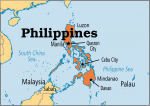Constant migration and the ever rising number of international transactions call for taking new action in the legal sector – including law enforcement. In compliance with the International Human Rights Law, a Philippines Miranda Rights translation project was undertaken a few years back, headed by the Philippine National Police. The rights were translated and recorded into four Asian languages to make them more accessible to non-native speakers in the country.
Philippines Miranda Rights Translation Provides Greater Legal Rights
 “You have the right to remain silent. Anything you say can and will be used against you in a court of law. You have a right to an attorney. If you cannot afford an attorney, one will be appointed for you.” These are the rights any suspect being put under arrest in the United States is entitled to. International countries also have similar rights for the public when encountering law enforcement; however, both abroad and in the U.S. language barriers can pose a problem when trying to convey this message. While recent moves to make these rights more accessible to Limited English Proficient peoples in the U.S. have been undertaken, some countries have had a bigger head start.
“You have the right to remain silent. Anything you say can and will be used against you in a court of law. You have a right to an attorney. If you cannot afford an attorney, one will be appointed for you.” These are the rights any suspect being put under arrest in the United States is entitled to. International countries also have similar rights for the public when encountering law enforcement; however, both abroad and in the U.S. language barriers can pose a problem when trying to convey this message. While recent moves to make these rights more accessible to Limited English Proficient peoples in the U.S. have been undertaken, some countries have had a bigger head start.
In the Philippines, the primary languages are English (the official language), Filipino (the national language) and Tagalog (the first language of about one-third of the population). Other minority languages spoken by immigrants include Hindi, Indonesian, Japanese, Korean, Chinese, Standard Arabic, Standard German, and Vietnamese. With a growing number of immigrant populations whose proficiency in the local languages is limited, there is an urgent need for more legal translation and interpreting in the native languages of these minority groups. This includes translation and interpreting for potential encounters with law enforcement.
As a way to resolve this, and because of an increase in foreign suspects being arrested in the country, the Philippines National Police Human Rights Affairs Office undertook an initiative to translate the Miranda Rights into four new languages: Korean, Japanese, Chinese and Taiwanese. The translation requirement complies with the International Human Rights Law, which states that any individual in conflict should be able to fully understand his or her rights.
Philippines Miranda Rights Translation | Breaking Down Legal Language Barriers – With an App?

This app is available to all officers who can simply download it to their smartphone. After listening to police giving them the Miranda warning in English, the suspects then hear the recording in their own native language to ensure that they are properly informed of their rights. The project was coordinated and overseen by the PNP and the embassies from the four countries involved – Korea, Japan, China, and Taiwan.
Why Are Accurate Legal Translations and Interpreting Important?

Arguing lack of proficiency in a given language, and thus not being properly informed of their rights, has at times allowed criminals to walk away uncharged from an offense. Conversely, those who may be innocent but are unable to communicate may be unjustly jailed. Legal proceedings are also different country to country. Professional legal translation takes into account not only language, but also any cultural differences or distinctions between legal systems to ensure accurate communication of legal rights. Legal interpreters are beneficial for in-person meetings regarding a legal case. They ensure that both the defendant and the court understand the proceedings, and thus avoid the aforementioned errors of a case being thrown out due to a failure to address legal rights and the risk of an innocent person going to jail. For this reason, companies, public institutions and individuals should be aware of the importance of hiring well trained legal translation and interpreting services professionals who will lessen the risk of these costly mistakes. The Philippines Miranda Rights translation project is one example of the many steps countries everywhere can take to make their justice system more adaptable to the influence of foreign languages, and could very well serve as inspiration for more initiatives in the U.S.
About Language Connections:
Language Connections is one of the top language service companies in the US. Over the last 30 years, we’ve focused on providing the best business translation services, interpreting services, as well as interpreter training and customized language training programs. In addition to top-tier corporate language training, we offer certified corporate interpreters and professional business translation services in 200+ languages. Our network includes linguists with backgrounds in all major industries. They’re ready to meet your needs, whether they’re for technical translation services, legal translation, government translation services, international development translation services, education translation services, life sciences translation, or something else. Reach out to us today for a free quote on our cost-efficient and timely translation services, interpreters, or other linguistic services.
Language Connections Inc.
2001 Beacon Street, Suite 105,
Boston, MA 02135
Phone: +1-617-731-3510
Email: service@languageconnections.com


